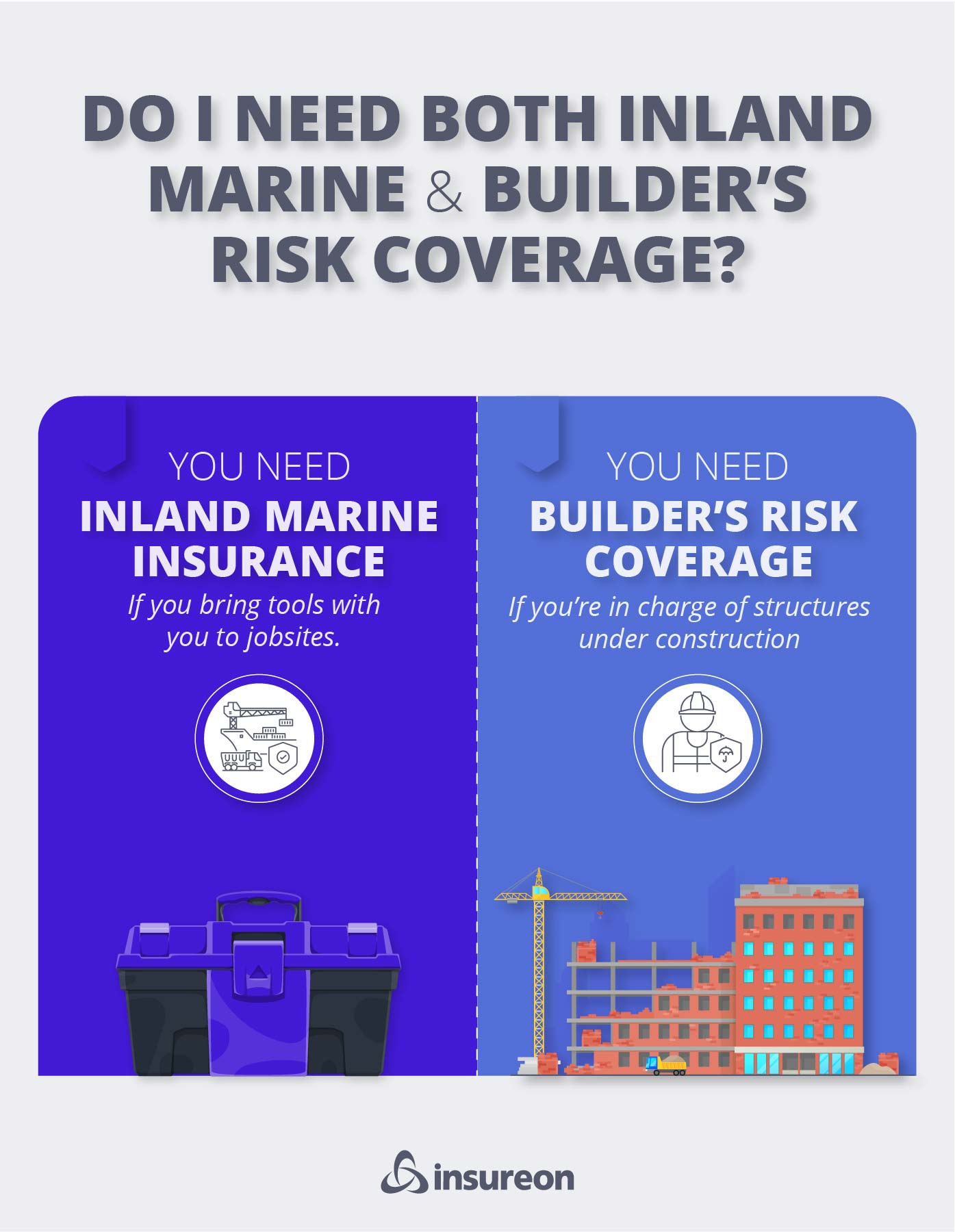
Inland marine vs. builders risk insurance
What is inland marine insurance?
Inland marine insurance covers your business property while in transit over land or when it's stored off-site. Business property includes equipment, tools, and products.
Unlike a traditional commercial property policy that protects your property at a fixed location, inland marine insurance is a "floater" policy that follows your property while away from your business location.
There are a few types of inland marine insurance in addition to the standard policy, including:
- Bailee insurance, which insures property that is not owned by your business but is temporarily in your care.
- Installation floater insurance, which protects against damaged materials being transported or stored at a job site.
- Tools and equipment insurance, which covers equipment as it is transported to and from construction sites.
Despite how the name sounds, inland marine insurance has nothing to do with the sea. The name refers to the fact that it covers a range of policies related to financial losses during land transportation, while ocean marine insurance covers losses related to water transportation.

What is builder's risk insurance?
Builder's risk insurance, also called course of construction insurance, is a type of inland marine coverage that protects small businesses from expenses related to damages that occur during a construction project.
The policy covers physical losses and physical damage to the building under construction resulting from fire, vandalism, theft, and non-severe weather events. It also protects against damage to materials (whether on-site, in transit, or in storage).
Builder's risk is often purchased as a short-term risk management measure to help construction businesses avoid expensive mistakes or accidents that can occur during the course of construction.
Many clients will request a builder's risk policy to be purchased before signing a contract and starting a new construction project.

Is inland marine the same as builder's risk insurance?
Both inland marine insurance and builder's risk insurance are forms of inland marine coverage. General contractors and other construction professionals who work on job sites often purchase both policies. However, there are key differences between them.
Inland marine insurance is a broader category of policies that cover various types of movable property, such as tools, equipment, and materials.
Builder's risk policies specifically cover construction projects, the building being worked on, as well as tools, materials and equipment being stored on the job site.
Both policies protect your business property, but not always the same type of property, and not in the same situations:
- Inland marine insurance covers property being transported or stored off-site, but would not assist with the costs related to construction or damaged client property that occurs during the course of construction.
- Builder's risk protects business supplies, materials, and buildings being actively worked on, but likely won't extend to company property that is damaged or stolen while being stored or transported away from the construction site.
You can speak to a licensed insurance agent if you have questions about your unique business needs.

Do you need both inland marine insurance and builder's risk insurance?
You may need both policies depending on your business needs, client requests, and exposures.
For example, if you frequently transport or store business property when not specifically performing construction projects, you may only need an inland marine policy.
Inland marine policies are relevant to non-construction businesses, such as photographers, food trucks, and IT consultants who often transport expensive property but do not perform construction.
You may just need a builder's risk policy if you only plan on using and storing equipment and building materials to and from construction job sites. However, your property would not be covered in the event of an accident or incident that occurs while transporting equipment and materials to and from the construction site.
If you work in construction and frequently transport costly property, you should strongly consider carrying both policies to ensure your business is fully protected from costly property damage while away from your commercial property.
Additionally, clients, subcontractors, building owners, or commercial builders may require one or both policies before signing a contract.
Top professions that need small business insurance
Don't see your profession? Don't worry. We insure most businesses.
Protect your business with the right insurance policies with Insureon
With one easy online application, Insureon can help you find quotes from the U.S.'s leading insurance companies.
If you have questions about your insurance coverage, you can speak to our licensed insurance agents, who are about knowledgeable the best policies for the construction industry and beyond.
In addition to inland marine and builder's risk coverage, you can also discuss other important policies, such as general liability insurance and commercial property insurance, for protecting your business, clients, and employees.
Once you find the right liability coverage for your unique business operations, you can start your insurance policy and obtain a certificate of insurance, often within 24 hours.



























